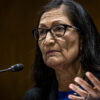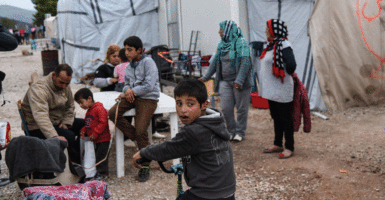As a candidate for president, Donald Trump advocated a restrictive U.S. policy toward refugee resettlement and other forms of legal immigration.
In his speech accepting the Republican nomination for president, Trump said he would suspend immigration from countries that are “compromised by terrorism.”
Trump, when he assumes office in January, will find that he has significant authority to fulfill his pledge.
“He can decide how many refugees we take and from what regions of the world we take them,” said Kevin Appleby, senior director of international migration policy at the Center for Migration Studies in New York, in an interview with The Daily Signal. “He has a pretty broad brush to pick and choose who he thinks is worthy of admission to the United States.”
Trump has not clarified his position on refugees since becoming president-elect.
But throughout his campaign, Trump targeted the U.S. refugee resettlement program, arguing the government’s vetting system needed to be tougher, especially for Syrians fleeing war and terrorism.
The Obama administration says the current vetting process for Syrian refugees is the most stringent screening for any category of legal immigrant. The process can take up to two years and involves in-person interviews, health tests, and other security checks with multiple government agencies, including the Department of Homeland Security and the State Department.
About 14,500 Syrians have been resettled in the U.S. since last October. There is no known case of a Syrian refugee being involved in a terror plot in the U.S. In January, the U.S. government arrested two men on terrorism-related charges who came to the U.S. as refugees from Iraq.
In September, the Obama administration announced that it wants to resettle 110,000 refugees from around the world—including a substantial number of Syrians—for the fiscal year that began Oct. 1. That’s up from 85,000 refugees last year.
The Refugee Act of 1980 gives the U.S. president unilateral power over how many refugees the country admits each fiscal year, and where they come from.
Congress is only consulted in the process and does not get an up or down vote on the numbers.
Traditionally, the refugee resettlement gets broad bipartisan support, but this year, many Republicans protested President Barack Obama’s pledge to raise the number admitted to the U.S.
“This has become a politically correct program where we are led to believe that we have to take refugees from all over the world no matter how dangerous the threat is,” said Rep. Brian Babin, R-Texas, in an interview with The Daily Signal. “We are out here trying to keep Americans safe. That is our No. 1 duty we have as elected officials.”
Babin has sponsored legislation pausing refugee resettlement from “terrorism hot spots” to the U.S.
He was among 37 Republicans who tried, but failed, to attach language to a must-pass spending bill passed in September that would have blocked federal funding to refugees from Syria, other countries in the Middle East, and North Africa until national security officials could guarantee that terrorists cannot infiltrate the screening process.
“Trump has the authority to do what we in Congress could not do, and suspend this program immediately, particularly from Islamic terrorist hot spots,” Babin said. “I urge him to follow through on his campaign promise.”
Refugee and immigration experts say Trump can indeed use his executive powers immediately to keep Obama’s 110,000 refugee target number for this fiscal year, or reduce it. He can even pause the program completely, or restrict refugees from specific countries.
“Trump has the authority to resettle 110,000 like Obama or zero refugees,” said Matthew La Corte, an immigration policy analyst at the Niskanen Center. “That is his decision with consultation with Congress and the State Department.”
Trump can also limit other forms of legal immigration to the U.S., as he and his incoming administration have hinted they may try and do.
Speaking on CNN’s “State of the Union” this weekend, Reince Priebus, the incoming White House chief of staff, said, “We’re going to temporarily suspend immigration from [certain countries or regions] until a better vetting system is put in place.”
Under U.S. law, the president has authority to use a proclamation to suspend the entry of “any aliens or of any class of aliens into the United States [who] would be detrimental to the interests of the United States.”
Over six decades ago, Congress, worried that communists would try and enter the U.S., authorized this executive authority as part of the Immigration and Nationality Act of 1952.
Obama used this power in 2011 when he issued a presidential proclamation suspending the entry of “any alien who planned, ordered, assisted, aided, and abetted, committed or otherwise participated in” war crimes or other violations of humanitarian law.
But immigration experts say the power has not been applied as broadly as Trump has proposed.
For example, early in his campaign, Trump called for “total and complete shutdown of Muslims entering the U.S.” He later removed the reference to religion and instead proposed barring people from regions of the world with a “proven history of terrorism” against the U.S. and the West.
“The statutory authority is clearly there for Trump to do what he said he would do,” said William Stock, president of the American Immigration Lawyers Association, in an interview with The Daily Signal. “But the power under the law has usually been used in a case-by-case manner, impacting narrow classes of people. The broader the assertion of the authority, the more likely a successful court challenge against it.”
Opponents of Trump’s proposals, including refugee advocates and national security experts, say that limiting U.S. assistance to the most vulnerable of immigrants is detrimental to the fight against terrorism.
They say that such a withdrawal from the world makes the case for terrorist groups such as the Islamic State that seek to turn Muslims against the West.
“We are at a pivotal moment in our country,” Appleby said. “If we start closing our doors, pulling up the drawbridge will undermine our national interests. It gives the extremists more power to demonize us and use it as a propaganda tool. We are looked at as a humanitarian leader, and if we withdraw that commitment, the rest of the world will follow and then we will really have a crisis on our hands.”
























